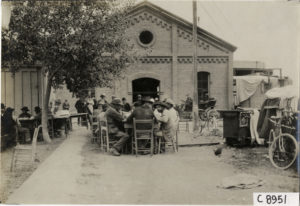
Agnews Insane Asylum Patients Eating Lunch, courtesy Detroit Public Library Digital Collections
Overcrowding in asylums created miserable conditions for patients (see last post), but it also made attendants’ workload overwhelming and stressful. They had little time off compared to even today’s harried worker: usually a half day off a month, a couple of evenings off a week, and an entire Sunday off once a month. Additionally, attendants usually lived on-site and could seldom “get away” from their work atmosphere–long hours and stress just added to their own mental burden.
Attendants started their days early in order to get patients up, out of bed, and dressed at 6:00 a.m. or 7:00 a.m. each morning, and perhaps wash and change soiled patients the night shift had missed. They supervised patients’ daily activities, broke up altercations, noted their illnesses or other changing conditions, bathed and/or shaved them, and helped serve meals. Attendants cleaned incessantly, and kept constant watch over their wards for any dangerous conditions stemming from violent, suicidal, or delusional patients.

Male Attendants at Willard Asylum for the Chronic Insane
Attendants also needed to socialize with patients: they gently steered them from obsessive or disturbing thoughts, reassured them when they worried about family and friends, led them into constructive conversation, and so on. Ideally, they could be the trusted friend and mainstay that supplemented the efforts of the asylum’s medical staff.

Attendants at Pennsylvania Hospital for the Insane
Unfortunately, these important therapeutic tasks were usually the first to go when the work of physically caring for patients overwhelmed attendants. Even worse, their own stress and frustration could spill over into their interactions with patients, making a miserable environment even worse for them.